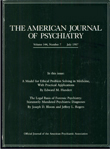Postpartum Depression: Causes and Consequences
Professor O'Hara is the first non-British President of the Marcé Society; he has led a research team dealing with “post natal depression” for a considerable number of years. The body of research he has produced is perhaps the most important coming from the United States since the pioneering efforts of the Gordons in the 1950s and the studies of Paffenbarger in the 1960s. Professor O'Hara's surveys rank with best British surveys in this area.
The present monograph—a work of some 80,000 words with 250 references to articles and books published in 1956–1993 (all in the English language)—is not really a review of the problem of postnatal depression, which would require a melding of personal research with other information coming from many other sources. It is a gathering together of Professor O'Hara's own work and is comparable to the publication of a thesis; it will be convenient for researchers who can study it in this form rather than as a large number of papers published in different journals.
It is an impressive contribution, but I have some concerns, which begin on page 1, where the author tells us that emotional disturbances in the postpartum period are usually divided into three groups—postpartum blues, postpartum depression, and postpartum psychosis.
This is an oversimplification. Peripartum psychiatry is a complex discipline; it is important, both for research and clinical practice, to do justice to this complexity. There are dangers in conglomerating diverse disorders under a single heading, such as postpartum depression.
Two large groups of disorders are not covered in this monograph: 1) patients with major anxiety, obsessive-compulsive, or posttraumatic (stress) disorders, all of which usually meet criteria for depression but have a different focus with important etiologic and treatment implications, and 2) disorders of the mother-infant relationship, which form a vital component of about 25% of all patients presenting with postpartum depression.
These topics, which are much more important than the maternity blues and more common than puerperal psychosis, are not listed in the index and are hardly mentioned.
With these reservations, this book can be recommended to those working in the field.



